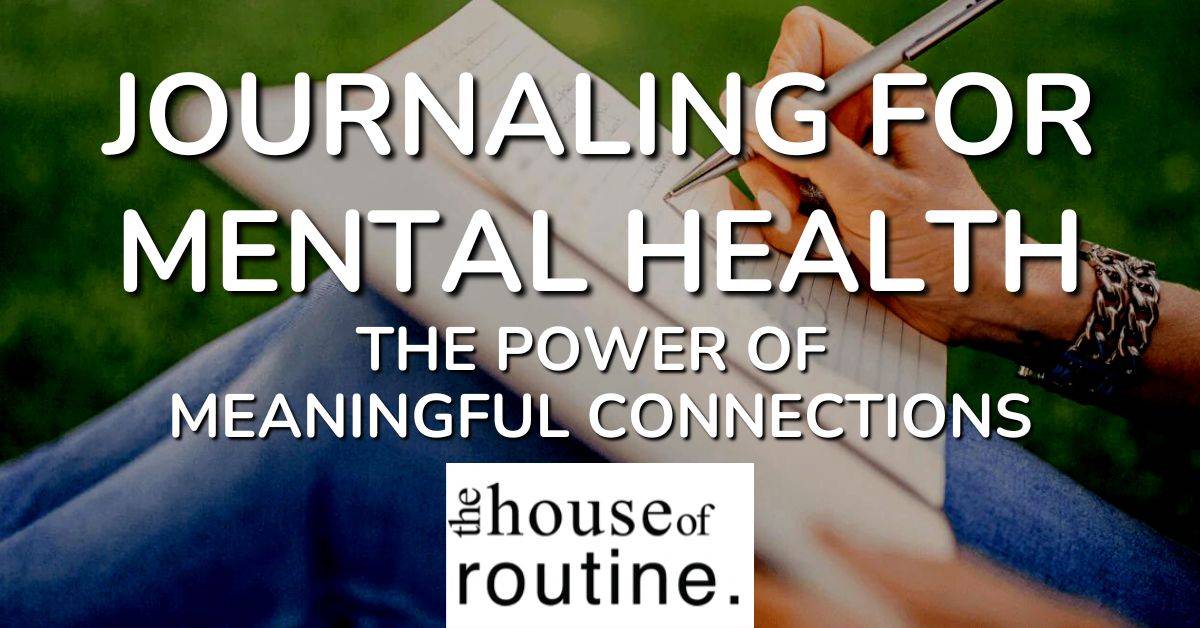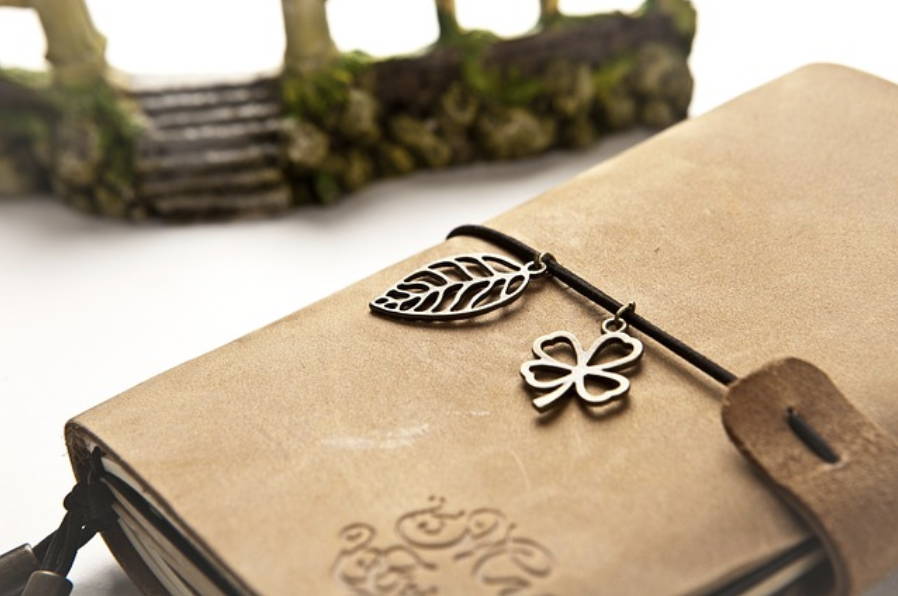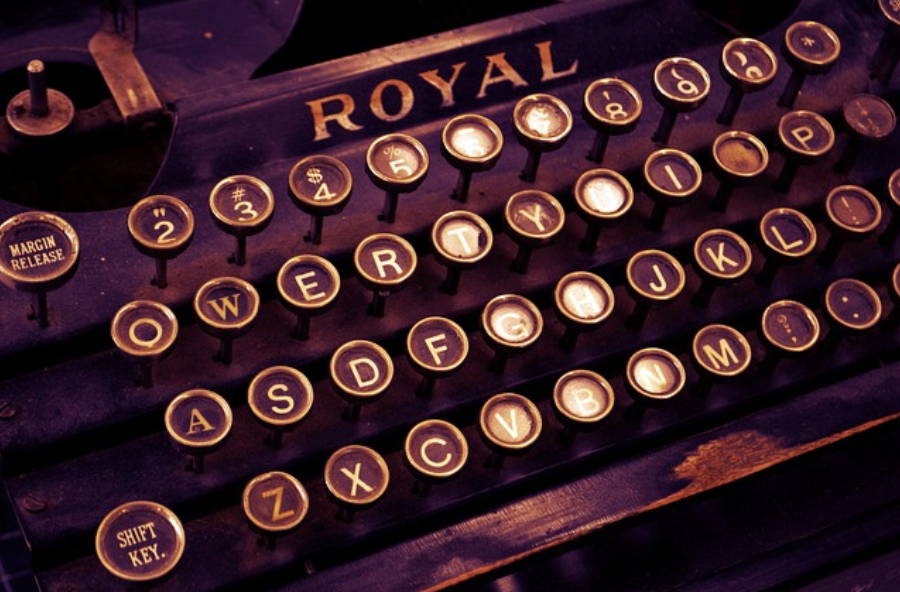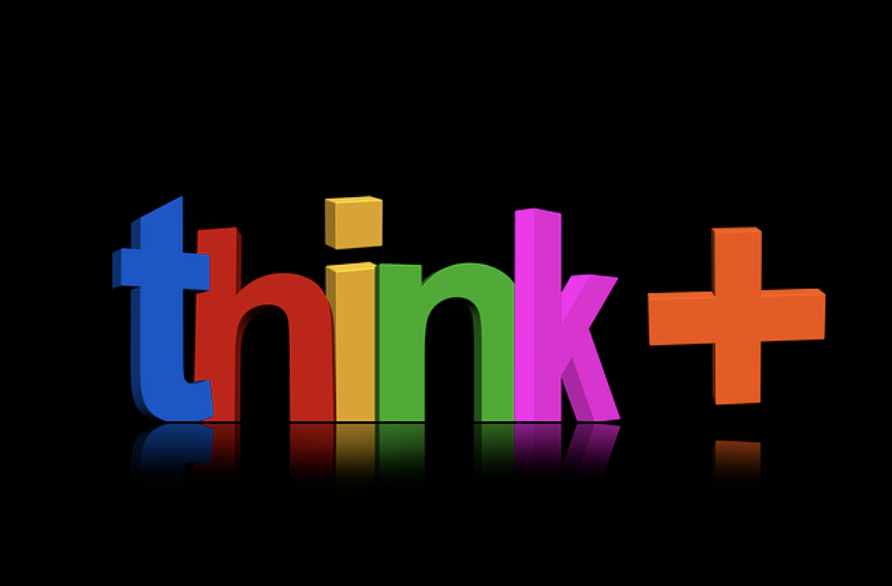Journaling For Mental Health - The Power of Meaningful Connections

When it comes to our mental health, we know that it's important to keep our minds healthy and sharp.
One way to do this is to start a mental health journal.
Journaling can help with everything from managing symptoms of anxiety and depression to reducing stress levels. It can even improve certain medical conditions and identify things you never new existed.
It's also been shown to help with physical health conditions.

What Is Journaling?
Journaling is a written record of personal thoughts, feelings, and experiences.
It can be a way to explore your inner self, process difficult emotions, and work through challenging life events. Journaling can also be a form of self-care, providing a space for you to reflect on your day-to-day life and connect with your thoughts and feelings.
When done regularly, the positive aspects of journaling can help reduce stress and anxiety, boost mood and energy levels, improve sleep quality and even get rid of negative emotions while elevating your overall mental health.
There are many different ways to journal, so you can find a method that works best for you. Some people prefer to write in long-form paragraphs, while others prefer to bullet point their thoughts or use creative expressions such as drawing, to do list (especially college students) or collage-making.
According to Mental Health America, there is no “right” way to journal – the important thing is that you find a method that helps you feel relaxed and open to self-exploration.

Benefits Of Jouranling
Journaling can have powerful mental health benefits.
It can help you process emotions, gain clarity on your thinking, and develop a deeper understanding of yourself and your mental health issues. Journaling can also help you build stronger relationships with others by fostering meaningful connections.
Improved Mental Health
It can help in exploring their thoughts and feelings, and make meaningful connections between their thoughts, feelings, and behaviors.
A preliminary randomized controlled trial titled "Online Positive Affect Journaling in the Improvement of Mental Distress and Well-Being in General Medical Patients With Elevated Anxiety Symptoms" indicated a decreased mental distress in patients who made journaling a regular habit.
This can lead to a greater understanding of oneself, and improved self-awareness.
Journaling can also help to manage mental distress and anxiety, as it can be a form of ‘active listening’ – where you are giving your full attention to your thoughts and feelings. This can help to process difficult experiences, work through emotions, and develop healthy coping strategies for self improvement.
Regular journaling can also help to boost mood and increase feelings of well-being.
This is because expressing yourself through writing can help to release built-up tension and stress, and can be a form of self-care when getting ready for stressful events. It can also be used as a tool to set goals, reflect on progress made, and celebrate small victories.
Good mental health is not just the absence of mental illness.
It is also about how you think about yourself, how you cope with stress, how resilient you are when things don't go as planned, and your ability to maintain positive relationships. The act of writing (some call it depression journaling) can help you process your negative thoughts and help with emotional expression.
According to Rochester Medical Center, journaling can increase the likelihood of you reaching out for social support to friends and family when trying to improve your mental health. Journaling can be linked to decreased mental distress which in turn can boost your immune system, and improve your sleep quality.

Increased Creativity
This is particularly beneficial for people who work in creative fields, but can be helpful for anyone who wants to increase their creativity.
You can use journaling to brainstorm new ideas, work through creative blocks, and explore different perspectives.
By focusing on the process of creativity itself, you can become more creative in your everyday life.

Improved Communication Skills
Journaling can help improve communication skills in several ways.
First, the simple act of putting thoughts into words on a regular basis can hone the ability to communicate clearly.
In addition, since journaling is usually a private activity (a form of self talk), it can provide a safe environment to explore sensitive or emotional topics that might be difficult to discuss with others. Over time, journaling can also help build communication skills by providing a regular opportunity to practice active listening.
When journaling about conversations with others, it can be helpful to write down not only what was said, but also what the speaker’s body language and tone conveyed. This exercise can help develop the ability to read nonverbal cues, which is an important part of effective communication.
Enhanced Problem-Solving Skills
We often face challenges in our lives that leave us feeling stuck.
Whether it’s a difficult decision at work, problems with a relationship, or just stress from day-to-day life, we can all benefit from enhanced problem-solving skills. Journaling is a great way to improve your problem-solving skills. When you journal, you force yourself to slow down and think about the situation at hand.
You can’t just react emotionally; you have to take the time to process your thoughts and figure out a solution. This type of reflection can help you see problems more clearly and find creative solutions that you may not have thought of before.
In addition, journaling can help you learn from your mistakes.
If you’re constantly facing the same types of problems, it may be because you’re not learning from previous experiences. Journaling allows you to go back and review what didn’t work in the past so that you can avoid those same mistakes in the future.
No need to feel anxious or seek psychiatric treatment - you have the ability to manage symptoms of anxiety all by yourself without mental health services. By taking the time to journal, you’re setting yourself up for success in both the short- and long-term.

The Different Types of Journals You Can Keep
There are many different journaling styles that you can choose from depending on what you want to get out of your journal.
Some people journal for self-care and reflection, while others journal for creative inspiration or to document their travels.
Whatever your reason for journaling, there is a style that will suit your needs. In this article, we will explore the different types of journals you can keep.
A Gratitude Journal
Keeping a gratitude journal is one of the simplest and most effective ways to feel happier.
Every day, write down five things you’re grateful for. They can be big things like your health or your family, or small things like a delicious meal or a sunny day.
Not only will this make you feel better in the moment, but studies have shown that gratitude journaling can have a lasting impact on your overall satisfaction with life.
If you’re struggling to think of things to be grateful for, try focusing on the good things that have happened to you in the past week, the people who have helped you, or even the simple pleasures in life like a hot shower or a fresh cup of coffee.
Daily Journal
A daily journal is perhaps the most popular type of journal, as it allows you to track your thoughts, feelings, and experiences on a day-to-day basis. This can be a great way to process your emotions, reflect on your day, and document your life.
You can write in a daily journal as little or as often as you like – there are no rules! Some people prefer to write in their journal first thing in the morning, while others prefer to write in the evening before bed.
There is no right or wrong time to write – simply do what feels best for you.
The Reflection Journal
A reflection journal is similar to a daily journal, but it goes deeper than just recording events.
It prompts you to reflect on your day, week, or month and think about the larger themes and patterns in your life. You might ask yourself questions like:
- What were the major highlights of my week?
- What did I learn this month?
- What are some things I’m grateful for?
- What challenges did I face?
The Goal-Setting Journal
If you’re someone who loves making lists and setting goals, then a goal-setting journal might be for you. In this type of journal, you set goals for yourself (both short-term and long-term) and track your progress over time. This can be a great way to stay motivated and accountable as you work towards achieving your dreams.
The Creative Journal
If you’re creative or artistically inclined, then a creative journal might be the perfect outlet for you. In this type of journal, you can express yourself through words, drawings, paintings, collages, etc. There are no rules – just let your creativity flow!
A Dream Journal
Dream journals are probably the most common type of journal. Many people choose to keep a dream journal in order to better understand their dreams and what they might mean. Dreams can often be cryptic or hard to remember, so keeping a written record of them can be very helpful.
To keep a dream journal, simply write down any dreams you can remember upon waking, in as much detail as possible. You can also include your own interpretation or thoughts on the dream. If you have multiple dreams in one night, try to write them down in the order that you remember them.
A Five-Year Journal
A five-year journal, also known as a future diary, is a journal that you write in for five years, with each day of the year having its own page. The idea is that you write in it every day for five years, so that you can look back and see how your life has changed over time.
The great thing about a five-year journal is that it forces you to be concise; you can’t write pages and pages about your day, because you only have one page for each day.
This means that you have to be selective about what you include, which can actually be quite therapeutic. It can also be fun to see how your handwriting changes over time!

How To Start Journaling
If you've never tried journaling before, it can be tough to know where to start.
After all, there are so many different styles and methods out there.
For example, you might want to try bullet journaling, which is a system that helps you organize your thoughts and tasks for the day.
Or you might prefer to keep a more traditional diary, where you write about your day-to-day experiences. Whichever method you choose, the important thing is to find a journaling style that works for you.
Pick A Journal Type
There are many different ways to journal, and it’s important to find a method that works for you. We've already discussed them above.
Set A Schedule
One of the simplest ways to get into the habit of journaling is to set a schedule.
Choose a journaling time that you can stick to every day, whether it’s first thing in the morning, during your lunch break, or right before you go to bed.
If you have trouble remembering to journal, set a reminder on your phone or computer, or keep your journal in a spot where you’ll see it often.
Once you’ve established a regular journaling habit, you can be more flexible with your timing. The most important part is to journal regularly.
Find A Journaling Method That Works For You
There are many different ways to journal, so find a method that works for you.
Some people prefer to write narrative style journals, which tell the story of your day; others prefer bullet journals with quick lists and notes; and some people like to mix things up with art journaling, which combines images and words. Don't worry too much about grammar or sentence structure.
You can also experiment with different mediums. If you prefer not to write by hand, try keeping a digital journal on your computer using Google docs or smartphone.
Or if you’d like to get more out of your journaling practice, try using a combination of techniques.
For example, you could start each day with stream-of-consciousness writing, then move on to listing things you’re grateful for, and end with doodles or sketches.
Decide What To Write About
Now that you’ve decided to start a journal, it’s time to decide what to write about.
This may seem like a daunting task, but it doesn’t have to be. To get started, simply ask yourself what you want to get out of journaling. Do you want to use your journal as a way to vent frustrations or get better at stress management?
Or, do you want to use it as a creative outlet to jump start your writing career? Maybe you just want a place to document your day-to-day life and thoughts with each journal entry.
Once you know what you hope to gain from journaling, it will be easier to decide what topics to write about.
If you’re not sure where to start, consider some of the following journaling ideas:
- Write about your day: What did you do today? How did you feel? What are your thoughts on the current events happening in the world?
- Set goals and track your progress: What do you hope to achieve in the next year? The next five years? How can you break down these goals into smaller, more manageable steps?
- Write letters (to yourself or others): Sometimes it can be therapeutic to write a letter – even if you don’t plan on sending it. Write a letter to yourself 10 years from now. What advice would you give your future self? Alternatively, write a letter to someone who has passed away or someone who hurt you in the past. This can be a way of coming to terms with these complicated feelings.
- Create a bucket list: What do you want to do before you die? This can be anything from big (visit every continent) to small (try 10 new foods).
- Keep track of your dreams.

Journaling Prompts
There is no one-size-fits-all answer for how to journal for mental health, but there are some commonalities among effective journaling practices.
Prompts for mental health can be a helpful starting point for many people, giving them a specific topic or question to focus on as they write.
If you’re not sure where to start, or if you’re feeling stuck in your current journaling practice, consider trying out some of the following prompts:
- What are three things you’re grateful for today?
- What was the best part of your day?
- What were your successes today, big or small?
- What challenges did you face today and how did you cope with them?
- Who are the people in your life who support you and make you feel loved?
- What are your top five values? Why do they matter to you?
- When have you felt most like yourself? Describe that time in detail.
- What do you love about yourself, both inside and out?
- What aspects of your life bring you joy? Why do they make you happy?

The Power of Expressive Writing
Expressive writing is a tool that has been shown to have numerous benefits for mental health and emotional healing.
It can be used to help process and cope with negative emotions, manage upsetting events and anxious thoughts, and promote overall mental wellbeing.
Writing about oneself can be a healthy way to express emotions and explore personal thoughts and feelings. It can also be a great tool for self-reflection and personal growth.
What Is Expressive Writing?
Expressive writing is a form of personal writing that focuses on feelings, experiences, and personal growth. It can be used as a tool for self-exploration and healing.
Writing expressively can help you to:
- Explore your emotions and experiences
- Better understand yourself
- Manage stress and anxiety
- Boost your mood
- Improve your physical health
- Identify your coping mechanisms
Emotional And Physical Health Benefits Of Expressive Writing
Many people find it helpful to write about their thoughts and feelings, especially when they are dealing with a traumatic event or stressful situation.
Just as talking to a trusted friend can help you work through your problems, writing about them can also be therapeutic. Expressive writing has been found to have a number of positive effects, including reducing stress and anxiety, improving mood, and boosting self-esteem.
It can also help you enjoy writing more, make sense of your experiences, and develop a greater sense of clarity and understanding. There is no “right” way to do expressive writing – it is entirely up to the individual how they want to approach it.
Some people find it helpful to write for a set period of time each day, while others prefer to write only when they feel the need. There are no rules about what you should or shouldn’t write about – just let your thoughts flow onto the page.
If you’re not sure where to start, try focusing on one particular event or experience that has been bothering you. Don’t worry about spelling or grammar, just let the words come out however they want. You may be surprised at how much better you feel after getting your feelings down on paper (or screen).
How To Start Expressive Writing
If you’ve never tried expressive writing before, it can be helpful to know how to get started.
This type of writing is personal and doesn’t necessarily require any specific structure or form.
However, some people find it helpful to start with a prompt or question to get the creative juices flowing.
Once you start writing, let the words flow naturally without editing or censoring yourself.
It can be helpful to set a timer for 20-30 minutes and just keep writing until the time is up. Remember, there is no “right” way to do this – just let the words come out however they want to.
If you’re not sure what to write about, here are some prompts that may help get you started:
- Write about a time when you felt really proud of yourself
- What are your hopes and dreams for the future?
- What does happiness mean to you?
- Write about a time when you overcame a challenge
- Think of someone who has had a positive impact on your life and write about why they are important to you
- What are things that make you feel grateful?

